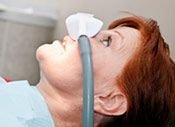 There's so much dentistry can do these days to make your mouth healthier and your smile more beautiful. Yet many people don't take advantage of this because of a long-standing fear of dental treatment. If you are one of these people, rest assured that it's possible to have an experience that's free of anxiety and pain. This can be accomplished by blocking your sensations of pain with local anesthetics or by giving you medication that can help you relax. Sometimes both are needed to ensure maximum comfort, especially if you are someone for whom the injections that deliver local anesthetics are themselves a major source of anxiety.
There's so much dentistry can do these days to make your mouth healthier and your smile more beautiful. Yet many people don't take advantage of this because of a long-standing fear of dental treatment. If you are one of these people, rest assured that it's possible to have an experience that's free of anxiety and pain. This can be accomplished by blocking your sensations of pain with local anesthetics or by giving you medication that can help you relax. Sometimes both are needed to ensure maximum comfort, especially if you are someone for whom the injections that deliver local anesthetics are themselves a major source of anxiety.
When you are afraid of dental treatment, your guard goes up and your pain threshold goes down; anticipating that something will hurt makes you hypersensitive to every sensation — even sound. If this describes your experience in the dental chair, then you might benefit from sedatives that can be given during your visit to make that anxiety melt away.
Before any particular sedative is recommended, you will be asked to provide your complete health history, including any medications you are currently taking — both prescription and over-the-counter. It is also important to know if you smoke or drink. On the day of your treatment, you may need to have someone drive you to and from your appointment as certain medications take time to wear off.
Ways to Relieve Anxiety
 Oral Sedation — Oral sedation (given by mouth) is a popular option for many people precisely because it does not require the use of needles. Oral sedatives are either swallowed whole in pill form or can be dissolved under the tongue. Both methods work in a matter of minutes. A variety of oral sedative and anxiolytic (anxiety-dissolving) medications have been developed through extensive research and testing to make your experience of dental treatment as comfortable and relaxing as possible. All have long safety records after decades of use, and several even have “amnesic” properties, meaning you will remember little to nothing, even though you are conscious throughout the treatment. Commonly prescribed medications include Valium®, Halcion®, Sonata®, Ativan®, Vistaril®, and Versed®. To learn more, view our chart on Types of Oral Sedatives
Oral Sedation — Oral sedation (given by mouth) is a popular option for many people precisely because it does not require the use of needles. Oral sedatives are either swallowed whole in pill form or can be dissolved under the tongue. Both methods work in a matter of minutes. A variety of oral sedative and anxiolytic (anxiety-dissolving) medications have been developed through extensive research and testing to make your experience of dental treatment as comfortable and relaxing as possible. All have long safety records after decades of use, and several even have “amnesic” properties, meaning you will remember little to nothing, even though you are conscious throughout the treatment. Commonly prescribed medications include Valium®, Halcion®, Sonata®, Ativan®, Vistaril®, and Versed®. To learn more, view our chart on Types of Oral Sedatives
 Inhalation Conscious Sedation — Nitrous oxide, a sedative you inhale, has been used in dental offices for nearly 100 years. It is a relatively poor pain reliever but a very good anti-anxiety medication. It is administered through a nasal hood, which resembles a small cup that is placed over your nose. The oxygen mixed with nitrous oxide provides a light-headed or even euphoric feeling, which is quick to wear off so there is no “hangover” effect. All bodily functions remain essentially normal during the use of this sedative, which is very safe.
Inhalation Conscious Sedation — Nitrous oxide, a sedative you inhale, has been used in dental offices for nearly 100 years. It is a relatively poor pain reliever but a very good anti-anxiety medication. It is administered through a nasal hood, which resembles a small cup that is placed over your nose. The oxygen mixed with nitrous oxide provides a light-headed or even euphoric feeling, which is quick to wear off so there is no “hangover” effect. All bodily functions remain essentially normal during the use of this sedative, which is very safe.
